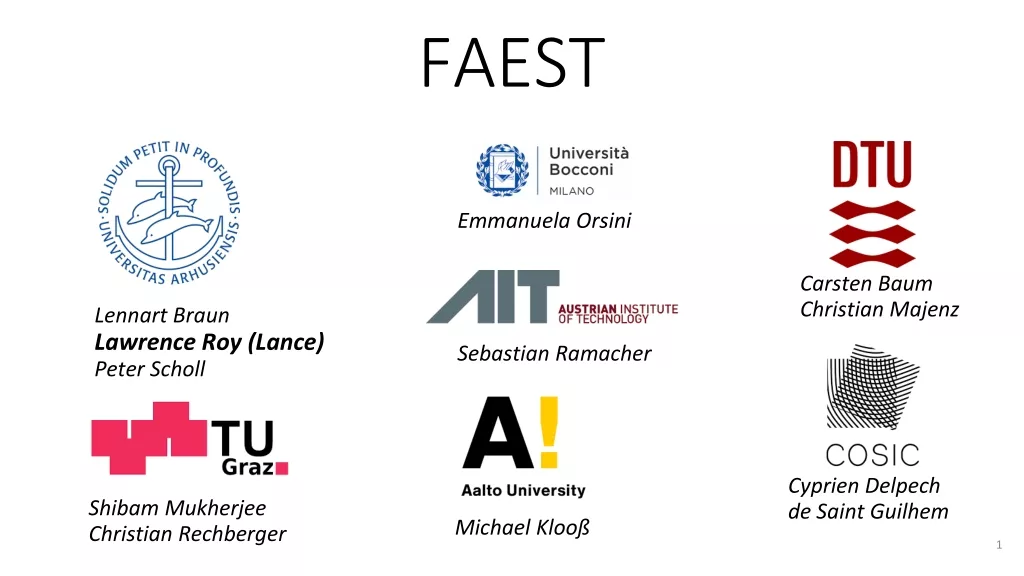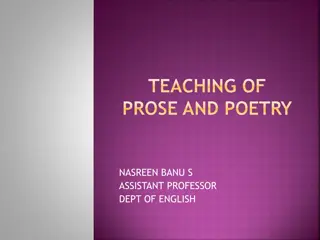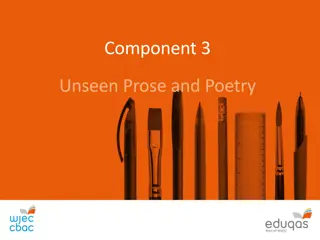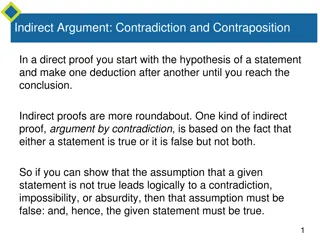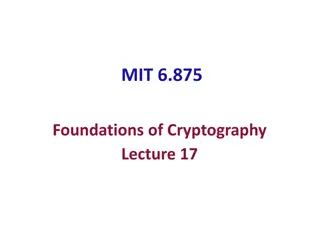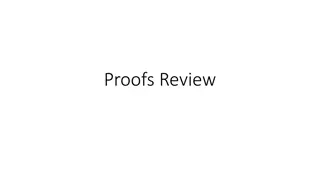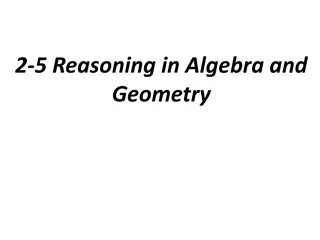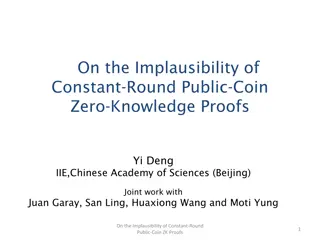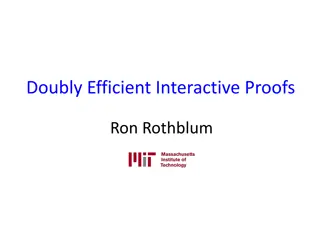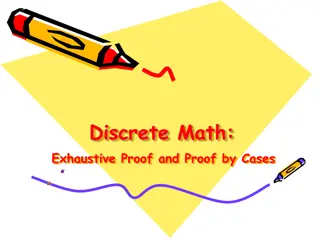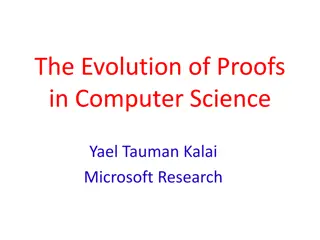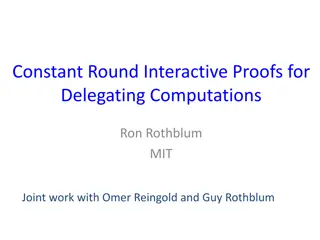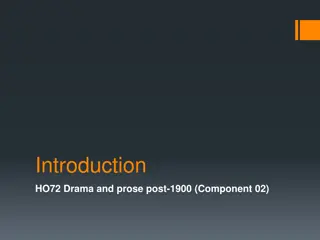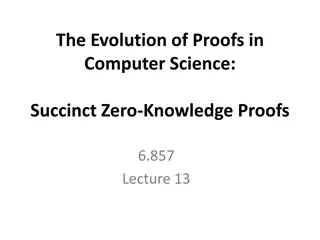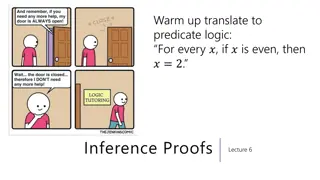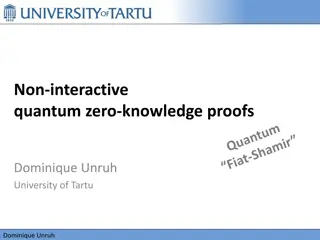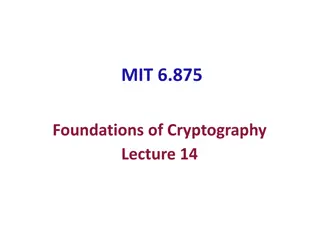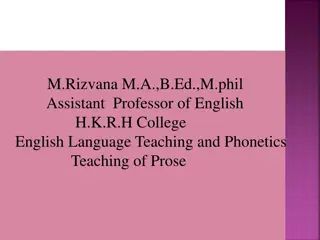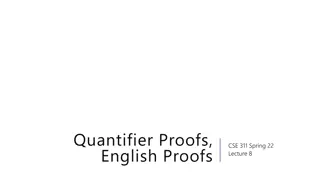
Proving Even Integer Multiplication Property
Learn how to prove that if an integer is even, then its double is also even using symbolic logic and algebraic manipulation. A step-by-step proof is provided to demonstrate this property.
Download Presentation

Please find below an Image/Link to download the presentation.
The content on the website is provided AS IS for your information and personal use only. It may not be sold, licensed, or shared on other websites without obtaining consent from the author. If you encounter any issues during the download, it is possible that the publisher has removed the file from their server.
You are allowed to download the files provided on this website for personal or commercial use, subject to the condition that they are used lawfully. All files are the property of their respective owners.
The content on the website is provided AS IS for your information and personal use only. It may not be sold, licensed, or shared on other websites without obtaining consent from the author.
E N D
Presentation Transcript
Even Warm-up An integer ? is even if (and only if) there exists an integer ?, such that ? = ??. Let your domain of discourse be integers. Let Even ? = ?(? = 2?). Prove if ? is even then ?2is even. Write a symbolic proof (with the extra rules Definition of Even and Algebra ). Then we ll write it in English. What s the claim in symbolic logic? ?(Even ? Even ?2)
Find The Bug Let your domain of discourse be integers. We claim that given ? ?Greater ?,? , we can conclude ? ?Greater(?,?) Where Greater(?,?) means ? > ? Given -- Elim (1) Elim (2) Intro (4) Intro (5) 1. ? ? Greater ?,? 2. Let ? be an arbitrary integer 3. ?Greater(?,?) 4. Greater(?,?) 5. ? Greater(?,?) 6. ? ? Greater(?,?)
Bug Found There s one other hidden requirement to introduce . No other variable in the statement can depend on the variable to be generalized Think of it like this -- ? was probably ? + 1 in that example. You wouldn t have generalized from Greater(? + 1,?) To ?Greater(? + 1,?). There s still an ?, you d have replaced all the ? s. ? depends on ? if ? is in a statement when ? is introduced. This issue is much clearer in English proofs, which we ll start next time.
English Proofs CSE 311 Fall 2020 Lecture 9
Announcements Please download a new copy of HW3. We fixed two typos over the weekend. Two optional readings going up today (maybe tomorrow ). Another explanation of domain restriction. An explanation of why mathematicians and computer scientists agreed that vacuous truth was the right definition. We ll link both on this week s section in the calendar.
Today We re taking off the training wheels! Our goal with writing symbolic proofs was to prepare us to write proofs in English. Let s get started. The next 3 weeks: Practice communicating clear arguments to others. Learn new proof techniques. Learn fundamental objects (sets, number theory) that will let us talk more easily about computation at the end of the quarter.
Even Warm-up An integer ? is even if (and only if) there exists an integer ?, such that ? = ??. Let your domain of discourse be integers. Let Even ? = ?(? = 2?). Prove if ? is even then ?2is even. Write a symbolic proof (with the extra rules Definition of Even and Algebra ). Then we ll write it in English. What s the claim in symbolic logic? ?(Even ? Even ?2)
If ? is even, then ?2 is even. 1. Let ? be arbitrary 2.1Even(?) 2.2 ? (2? = ?) 2.3 2? = ? 2.4 ?2= 4?2 2.5 ?2= 2 2?2 2.6 ?(2? = ?2) 2.7 Even(?2) 3. Even ? Even(?2) 4. ?(Even ? Even(?2)) Assumption Definition of Even (2.1) Elim 2.2 Algebra (2.3) Alegbra (2.4) Intro (2.5) Definition of Even Direct Proof Rule (2.1-2.7) Intro (3)
If ? is even, then ?2 is even. 1. Let ? be arbitrary 2.1Even(?) 2.2 ? (2? = ?) 2.3 2? = ? 2.4 ?2= 4?2 2.5 ?2= 2 2?2 2.6 ?(2? = ?2) 2.7 Even(?2) 3. Even ? Even(?2) 4. ?(Even ? Even(?2)) Let ? be an arbitrary even integer. By definition, there is an integer ? such that 2? = ?. Assumption Definition of Even (2.1) Elim 2.2 Algebra (2.3) Alegbra (2.4) Intro (2.5) Definition of Even Direct Proof Rule (2.1-2.7) Intro (3) Squaring both sides, we see that ?2= 4?2= 2 2?2. Because ? is an integer, 2?2 is also an integer, and ?2 is two times an integer. Thus ?2 is even by the definition of even. Since ? was an arbitrary even integer, we can conclude that for every even ?, ?2 is also even.
Converting to English Start by introducing your assumptions. Introduce variables with let. Introduce assumptions with suppose. Always state what type your variable is. English proofs don t have an established domain of discourse. Don t just use algebra explain what s going on. We don t explicitly intro/elim / so we end up with fewer dummy variables Let ? be an arbitrary even integer. By definition, there is an integer ? such that 2? = ?. Squaring both sides, we see that ?2= 4?2= 2 2?2. Because ? is an integer, 2?2 is also an integer, and ?2 is two times an integer. Thus ?2 is even by the definition of even. Since ? was an arbitrary even integer, we can conclude that for every even ?, ?2 is also even.
Lets do another! First a definition Rational A real number ? is rational if (and only if) there exist integers ? and ?, with ? ? such that ? = ?/?. Rational(?) ? ?( Integer ? Integer ? (? = ? ?) ? 0)
Lets do another! The product of two rational numbers is rational. What is this statement in predicate logic? ? ?([rational ? rational(?)] rational(??)) Remember unquantified variables in English are implicitly universally quantified.
Doing a Proof ? ?([rational ? rational(?)] rational(??)) The product of two rational numbers is rational. DON T just jump right in! Look at the statement, make sure you know: 1. What every word in the statement means. 2. What the statement as a whole means. 3. Where to start. 4. What your target is.
Lets do another! The product of two rational numbers is rational. Let ?,? be arbitrary rational numbers. Therefore, ?? is rational. Since ? and ? were arbitrary, we can conclude the product of two rational numbers is rational.
Lets do another! The product of two rational numbers is rational. Let ?,? be arbitrary rational numbers. By the definition of rational, ? = ?/?, ? = ?/? for integers ?,?,?,? where ? 0 and ? 0. Multiplying, ?? =? ?= Since integers are closed under multiplication, ?? and ?? are integers. Moreover, ?? 0 because neither ? nor ? is 0. Thus ?? is rational. Since ? and ? were arbitrary, we can conclude the product of two rational numbers is rational. ? ? ?? ??.
Now You Try The sum of two even numbers is even. 1. Write the statement in predicate logic. 2. Write an English proof. 3. If you have lots of extra time, try writing the symbolic proof instead.
Even Now You Try An integer ? is even if (and only if) there exists an integer ?, such that ? = ??. Fill out the poll everywhere for Activity Credit! The sum of two even numbers is even. Make sure you know: 1. What every word in the statement means. 2. What the statement as a whole means. 3. Where to start. 4. What your target is. Go to pollev.com/cse311 and login with your UW identity Or text cse311 to 22333 1. Write the statement in predicate logic. 2. Write an English proof. 3. If you have lots of extra time, try writing the symbolic proof instead.
Heres What I got. ? ?([Even ? Even(?)] Even ? + ? ) Let ?, ? be arbitrary integers, and suppose ? and ? are even. By the definition of even, ? = 2?,? = 2? for some integers ? and ?. Summing the equations, ? + ? = 2? + 2? = 2(? + ?). Since ? and ? are integers, ? + ? is an integer, so ? + ? is even by the definition of even. Since ?,? were arbitrary, we can conclude the sum of two even integers is even.
Why English Proofs? Those symbolic proofs seemed pretty nice. Computers understand them, and can check them. So what s up with these English proofs? They re far easier for people But instead of a computer checking them, now a human is checking them. people to understand.
Set A set is an unordered unordered group of distinct We ll always write a set as a list of its elements inside {curly, brackets}. Variable names are capital letters, with lower-case letters for elements. distinct elements. ? = {curly, brackets} ? = 0,5,8,10 = 5,0,8,10 = {0,0,5,8,10} ? = 0,1,2,3,4,
Sets Some more symbols: ? ? (? is in ? or ? is an element of ?) means ? is one of the members of the set. For ? = 0,5,8,10 , 0 ?. ? ? (? is a subset of ?) means every element of ? is also in ?. For ? = 1,2 ,? = {1,2,3}? ?
Sets Be careful about these two operations: If ? = {1,2,3,4,5} 1 ?, but 1 ? asks: is this item in that box? asks: is everything in this box also in that box?
Try it! Let ? = 1,2,3,4,5 ? = {1,2,5} Is ? ?? Is ? ?? Is ? ?? Is 1 ?? Is 1 ??

